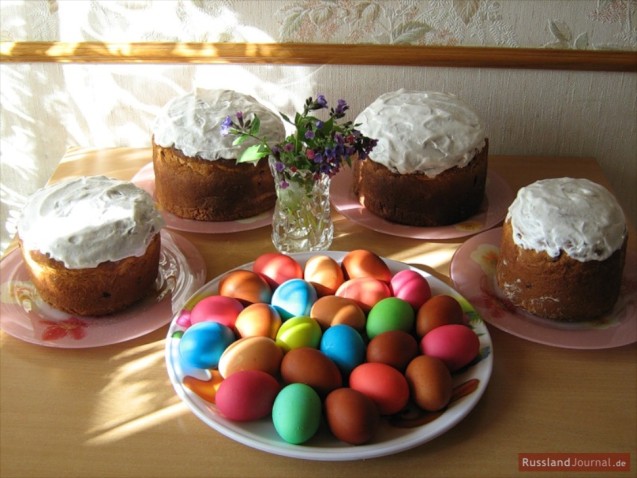Russian Easter Feast
There is a legend saying that on Easter Jesus Christ walks around, dressed in rags checking how merciful people are. As Matthew 5:7 says, "Blessed are the merciful; for they shall obtain mercy”. So it is a tradition in Russia to prepare loads of food on Easter, to make sure everyone who comes along gets enough to eat. In the past Christians used to share their meal with the poor bringing eggs, Easter bread, cheese and curd to hospitals and jails.
Easter Day traditionally starts with a big meal including eggs and Paskha (russ.: Пасха) – a mixture of quark, butter, eggs, sugar and raisins.
Easter Eggs in Russia
Eggs symbolize Jesus’ resurrection and are therefore especially important for Russian-Orthodox Christians. Eggs used to be cooked and painted already on Holy Thursday. It is still popular in Russia to dye the eggs using natural colors. The most common way is to dye eggs with onion skins.
Here is the method:
- Place onion skins in boiling water and simmer for a while. The shade can vary form yellow to dark brown, depending on the amount of onion skins. To produce an intensive brown shade, take lots of onion skins and simmer for about 30 minutes.
- Wash eggs, place in the pan with onion skins and cook all together for 10 minutes. Take eggs out of the pan, let cold water run over them to cool and dry. Rub eggs gently with vegetable oil to give them a nice shine.
- For marble effect, stir a bit of vegetable oil into the saucepan with eggs and onions skins.
- For a dot pattern, roll wet eggs in rice, wrap eggs in a piece of nylon to fix the rice and cook on onion-skin brew.
Hints and Tips for Proper Eggs
Mind these simple rules to make sure the eggs not only look nice but also taste good:
- Never boil eggs that come straight from the fridge. Bring eggs to room temperature to prevent cracking.
- Never boil eggs over high heat. Reduce to simmer as soon as they reach the boiling point.
- Choose a stainless saucepan just large enough to keep all eggs in one layer. This prevents eggs from rolling around and hitting each other.
- Prick the large end of the egg before cooking to let the expanding air escape.
- Eggs should be fully covered with water by 1 cm.
- Add some salt or vinegar into the water to keep the white from running out.
- Don’t cook eggs too long as they might get gummy.
- Very fresh eggs take 3 minutes longer to cook.
- Place boiled eggs immediately under cold water to stop the cooking process. This also helps peel the eggs.
- The best way to boil eggs is to place them into a saucepan, add cold water. Heat until the water is just about to boil and reduce the heat. Set the clock and simmer.
Cooking time is affected by the size and age of the eggs. Here are approximate cooking times:
- 3 minutes – runny yolk and white
- 4 minutes – firm white and runny yolk
- 5 minutes – firm white and soft yolk (especially in the middle)
- 7 minutes – firm white and yolk (hard-boiled)
Russian Easter Menu
Russian Easter menu does not consist of eggs only. After six weeks of fasting everyone was looking forward to tasty meat treats. In Russia they even used to cook up a 48-course Easter menu, one course for each day of abstinence. But also with fewer choices, to celebrate Easter each household cooked as much food as they could afford. In 1903, for example, the Romanov Royal Family enjoyed an Easter meal consisting of Paskha, Easter bread, eggs, sturgeon, beluga, salmon, pike-perch, pheasant, partridge, black cock, duck, lamb, bacon, tongue, beef, veal and different pierogi (filled pies).
Recipe for Beef Stew Russian Style
On Easter the table was not only crammed with food, but also beautifully decorated. Even poor families created nice tabletop arrangements using candles, spring flowers or Easter baskets decorated with colourful fabric remnants.
A simple game helped find out if the next year was going to be happy. Everyone took an Easter egg and hit the small end of the egg against other players’ eggs. The one with the hardest egg won and could look forward to a great year.
